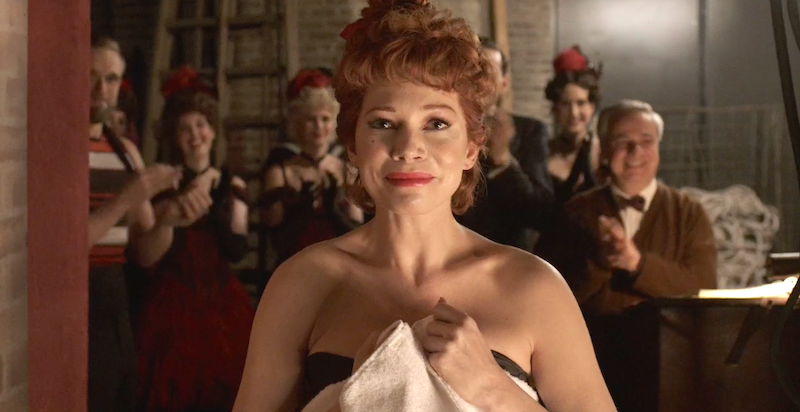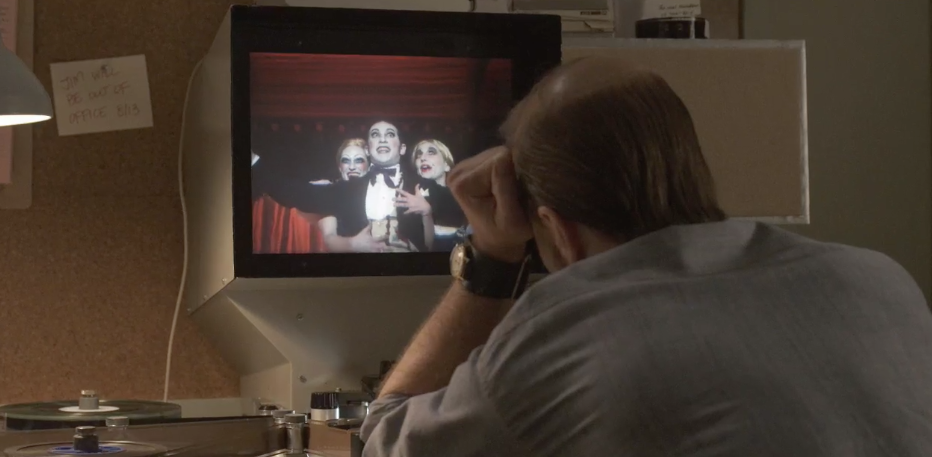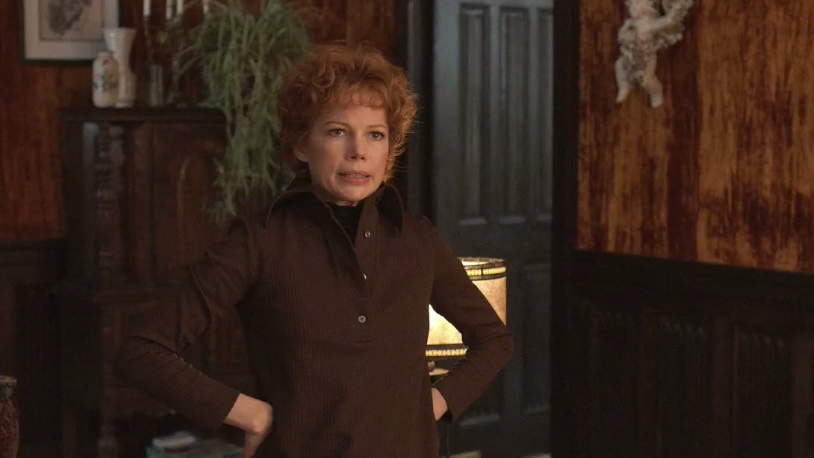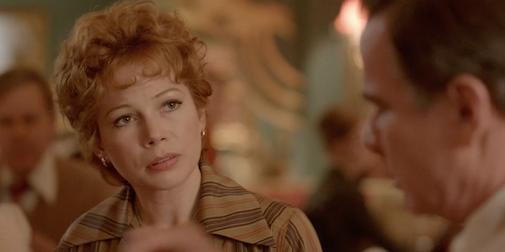Previously: Episode 1 and Episode 2

by Eric Blume
Fosse/Verdon certainly isn’t flawless, but it’s very strong out of the gate in these first three episodes. Hamilton director Thomas Kail guided the first two episodes with an assured hand, throwing us headfirst into the theater world with little set-up, allowing audiences to feel their way into the environment, and trusting that his two star performances will keep people hooked. His instincts were right on, and despite some awkward editing and temporal shifts, the show is arresting, absorbing, and intelligent.
Episode Three is directed by Adam Bernstein, a very talented guy who won an Emmy for 30 Rock and was nominated for Fargo...
He’s saddled with two of the least sophisticated bits of writing in the show so far: the first is the episode open, which shows Fosse entering the edit bay for Cabaret to a fantasy bevy of brightly-dressed, happy, loving chorus girls, only to exit the bay to a fantasy of disaster sliding down the same hallway. It’s an obvious and clumsy double-metaphor, and probably the worst segment of the show thus far. Second, he also has to execute some inevitably hoary flashbacks to Verdon’s young adulthood, moments that are always hard to bring off without feeling heavy-handed.

But the rest of the episode is wonderful, as it charts Fosse’s attempt to put Cabaret together and Verdon’s first stab at a straight play on Broadway. There’s an extended scene between Sam Rockwell and Michelle Williams when he makes a surprise appearance at the apartment once they’ve broken up, where he casually disrupts the life Verdon has made with their daughter. Rockwell and Williams are superb together, already doing variations of the same scene (this one is a riff on their long beach argument from the previous episodes), but finding new beats and new levels of exasperation, anger, and fatigue to keep everything interesting. They fight like real married couples fight. Everything they do together feels direct and true, and there’s always an air of resigned bemusement to their dynamic that helps you understand why they were together so long even when they weren’t.
The emotional pinnacle of the episode comes when Verdon tells Fosse she wishes he were directing the play, and how she can’t find her way into a monologue. He gives her the exact note she needs as the key: reminding her that she never raised her first son, the one she left to launch her career. Fosse was known for this cruel approach for results, and it’s a fantastic scene, followed by a killer delivery of the monologue by Williams afterwards.

I agree with Nathaniel’s claim that Michelle Williams might be giving the performance of her career as Gwen Verdon. This is a MAJOR piece of acting from Williams, often criticized for going to a familiar well of vulnerability, but here soaring to all-new heights. So many new flavors! One of the big surprises is Williams’ confidence with the comedy: she’s gloriously funny, and her Gwen comes at life with a refreshingly comic point-of-view. We’ve never seen Williams be this tough, either: her Verdon is a survivor, and she pushes through adversity with a matter-of-fact bravado that removes saintliness from the performance. Williams makes Verdon a loving mother and a hard worker, and a woman who is successful, exacting, resilient, sexual, and complex. She nails just the right amount of the actual Verdon (the voice, the stance, the physicality) without tipping into caricature, and you can feel Williams’ love for Verdon throughout. There’s joy and inspiration in Michelle Williams’ acting in every scene; It’s a full-conceived characterization, calibrated with authority and precision.
Rockwell hasn’t quite found Fosse, but his chemistry with his co-star is gangbusters, and he hasn’t had the writing Williams has, either. The one danger of this show is that, for viewers who have no insider reference, it almost alleges that Fosse was nothing without Verdon. They’re leaning a little TOO heavily on how much he relies on her, to the point where he looks like some lost slob in almost any scene she’s not in. That’s a reduction of the truth, a dynamic that’s less fascinating. It’ll be interesting to see if they find a better balance in the last three episodes.

What is your take on Fosse/Verdon thus far? Am I underestimating the great Sam Rockwell and what he can still give us? Leave your thoughts in the comments as always.